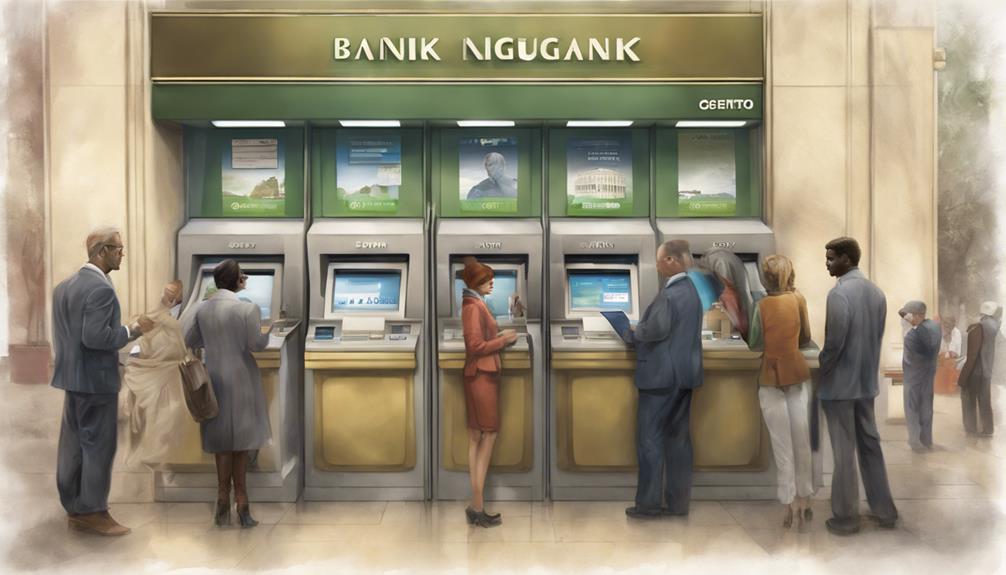When managing money abroad, steer clear of hasty money transfers and rushing financial transactions. Update your plans to match new circumstances and adjust investments, retirement savings, and insurance coverage. Watch out for high currency exchange fees, plan ahead for favorable rates before departure, and avoid airport services. Stay updated on tax laws in your home country and different jurisdictions to avoid penalties. Leverage tax benefits and avoid PFIC investments. Be cautious with airport kiosks and public Wi-Fi. Choose bank ATMs over private ones for lower fees. Use digital financial tools and prioritize a bank account for stability.
Key Takeaways
- Avoid hasty money transfers and rush in financial transactions during relocation.
- Update financial plans for new circumstances to prevent unexpected setbacks.
- Adjust investment portfolios, retirement savings, and insurance coverage accordingly.
- Stay informed on tax laws and obligations in different jurisdictions.
- Opt for competitive exchange rates at banks, not airport kiosks.
Expat Financial Mistakes

Avoiding common financial mistakes is vital for expatriates to secure their financial well-being while living abroad. One major pitfall expats often encounter is mismanaging their money, particularly when it comes to hasty money transfers. Rushing through financial transactions during relocation can lead to unnecessary fees and unfavorable exchange rates, eroding hard-earned savings.
It's important for expatriates to take the time to research and compare different transfer options to avoid these costly errors.
Another common financial mistake expats make is neglecting to update their financial plans to suit their new circumstances. Failing to adjust investment portfolios, retirement savings, or insurance coverage can result in missed opportunities or unexpected setbacks.
Currency Exchange Tips

When managing your finances abroad as an expatriate, one crucial aspect is securing the best value for your money through smart currency exchange practices.
To optimize your currency exchange, consider the following tips:
- Avoid Unnecessary High Fees: Exchanging currency at airport kiosks can lead to high charges and unfavorable rates, diminishing the value of your money. Choose banks that provide more competitive rates and lower fees for currency exchange compared to airport services.
- Plan Ahead for Competitive Exchange Rates: Planning in advance and exchanging currency at your bank or credit union before departure guarantees you obtain the most value for your money. This proactive approach helps you steer clear of unnecessary expenses and maximize your funds for your journey.
- Save Money by Avoiding Airport Services: Steering clear of airport currency exchange services helps you economize and have more funds for your trip. Exchanging currency in advance enables you to have cash on hand at a superior rate for your international travels.
Tax Considerations for Expats

As an expat, staying updated on tax laws in your home country is vital to avoid penalties.
Understanding your tax obligations in different jurisdictions is key to compliance.
Remember to take into account avoiding PFIC investments and adapting your financial plans to leverage tax benefits effectively.
Tax Law Updates
To stay financially secure while living abroad, it's necessary to keep up-to-date with tax law updates affecting expats. Understanding tax law changes is vital for managing your finances effectively as an expat. Here are three key considerations to help you navigate tax obligations in multiple jurisdictions:
- Stay Informed: Keep track of tax law changes in your home country and the country you're residing in to avoid any unexpected financial repercussions. Being aware of updates can help you adjust your financial plans accordingly and prevent any unpleasant surprises.
- Seek Professional Guidance: Given the complexities of tax obligations for expats living abroad, consulting with tax professionals can help you avoid common pitfalls like PFIC investments. Their expertise can ensure you comply with the tax laws of different jurisdictions and maximize any available tax benefits.
- Plan Ahead: Prepare for potential capital gains tax obligations by incorporating them into your financial management strategy. Planning ahead can help you avoid last-minute tax issues and ensure a smooth financial experience as an expat.
Leveraging Tax Benefits
Keep your financial goals on track by strategically leveraging tax benefits as an expat living abroad. Staying informed about tax law changes in your home country is critical for optimizing your financial plans.
Adapting your financial strategies to take advantage of tax benefits can result in significant savings. It's important to understand your tax obligations in multiple jurisdictions to avoid penalties and maximize returns.
By avoiding tax pitfalls such as PFIC investments, you can ensure compliance and financial stability. Additionally, planning for potential capital gains tax obligations is crucial to prevent unexpected tax liabilities.
By proactively managing your taxes and aligning your financial decisions with tax-efficient strategies, you can make the most of your expat status and secure your financial future while living abroad.
Stay informed, seek professional advice when needed, and navigate the complexities of international tax laws to optimize your financial position as an expat.
Avoiding PFIC Investments
Be mindful of the tax implications associated with PFIC investments to safeguard your financial interests as an expat living abroad. Investing in Passive Foreign Investment Companies (PFICs) can have complex tax rules that may lead to unfavorable tax treatment, potentially resulting in higher tax liabilities.
To navigate this area successfully, consider the following:
- Understand PFIC Rules: Educate yourself on the intricacies of PFIC investments and the associated tax implications to make informed decisions.
- Comply with Reporting Requirements: Be sure you meet all PFIC reporting requirements by maintaining proper documentation and understanding the necessary steps to avoid penalties.
- Consult a Tax Professional: Seeking guidance from a tax professional experienced in handling PFIC investments can assist you in thoroughly managing your tax obligations and maximizing your financial outcomes.
Long-Term Financial Planning

Long-term financial planning for expats involves strategically mapping out retirement goals and suitable locations to guarantee future financial security. When making significant financial decisions as an expat, considering the long term is pivotal. Addressing the financial impacts of relationship changes and adjusting plans accordingly are essential for stability. Regularly revisiting financial plans with changing circumstances helps maximize opportunities and adapt to evolving needs. Collaborating with tax experts and legal representatives is advisable to navigate the complexities of multiple jurisdictions and optimize long-term financial strategies. Maximizing opportunities while abroad is key to achieving financial goals and securing a comfortable future. Below is a table summarizing key aspects of long-term financial planning for expats:
| Aspect | Importance | Action Needed |
|---|---|---|
| Retirement Goals | High | Strategic planning and investment allocation |
| Relationship Changes | Significant | Adjust financial plans accordingly |
| Regular Reviews | Critical | Adapt plans to changing circumstances |
| Tax and Legal Assistance | Essential | Collaborate with experts for optimization |
Professional Financial Guidance

Considering professional financial guidance as an expat can greatly enhance your ability to navigate complex financial matters and optimize your financial strategies effectively. Seeking advice from experts such as financial advisers, tax specialists, and legal representatives can provide you with the necessary tools to make informed decisions and avoid potential pitfalls while managing your finances abroad.
Here are three key benefits of working with professional financial guidance:
- Tailored Financial Strategies: Collaborating with financial advisers can help you develop personalized financial strategies that align with your unique circumstances as an expat.
- Tax Compliance: Working with tax specialists and legal representatives can guarantee that you stay compliant with tax laws in different countries, minimizing the risk of penalties or legal issues.
- Optimized Financial Planning: Leveraging expert guidance allows you to explore a range of investment options and financial planning techniques tailored to your international lifestyle, ultimately assisting you in securing your financial future.
Travel Money Mistakes

When managing your finances abroad, remember to steer clear of airport kiosks for currency exchange to avoid hefty fees.
Be cautious of using public Wi-Fi for financial transactions to prevent potential data breaches.
Opt for smart travel cards or plan ahead to avoid high ATM withdrawal fees.
Currency Exchange Tips
Avoid costly currency exchange mistakes while traveling by steering clear of high fees and unfavorable rates at airports, foreign ATMs, and card machines abroad. When managing your money overseas, keep the following tips in mind:
- Exchange Currency Wisely: Avoid converting money at airports or foreign ATMs, as they often come with high charges and unfavorable rates that can greatly diminish the value of your money.
- Beware of US Dollars: Paying in US dollars on card machines abroad may lead to dynamic currency conversion (DCC) fees and inflated rates. Opt for paying in the local currency to avoid these extra charges and secure a fair exchange rate.
- Use Your Credit Card Smartly: When using your credit card abroad, always choose to pay in the local currency rather than your home currency. This choice will help you secure the most precise exchange rate without incurring DCC fees, ultimately saving you money in the long run.
ATM Usage Guidelines
Beware of private ATMs with high commissions and deceptive tactics targeting tourists when withdrawing cash abroad. These ATMs, often labeled as 'euronet' or attached to currency exchange offices, may impose hefty transaction fees and unfavorable currency exchange rates. To guarantee a smooth and secure transaction, opt for bank ATMs equipped with surveillance cameras.
Avoid generic-named ATMs and those attached to currency exchange offices, as they mightn't offer the same level of transparency and security as bank ATMs. Choosing bank ATMs over private ones can help you avoid unnecessary fees and ensure reliable cash withdrawals during your travels.
Digital Financial Tools

Digital financial tools such as wallets play an important role in helping you manage your money effectively while living abroad. These tools offer a range of features that can assist you in organizing and optimizing your financial management.
Here's how they can benefit you:
- Bank Sync: By connecting to your bank accounts, digital financial tools make it easy for you to track expenses and plan your finances efficiently.
- Budget Creation: These tools enable you to set budgets, track your expenses, schedule payments, and gain insights into your cash flow. This feature is particularly useful in ensuring that you stay within your financial limits while abroad.
- Security Measures: One of the key advantages of using digital financial tools is the robust security measures they provide. Your sensitive financial data and transactions are safeguarded, giving you peace of mind as you manage your finances remotely.
Bank Account Importance

Exploring the importance of having a bank account as an expat provides essential insights into managing your finances and ensuring financial stability while living abroad. A bank account isn't just a place to store money; it's essential for various aspects of expat life. From paying bills to providing proof of income for paperwork, renting apartments, and visa applications, a bank account is a fundamental necessity.
Opting for online banking enhances convenience, security, and provides global access to checking accounts for expats on the move. Additionally, having a bank account facilitates the receipt of your salary, ensuring financial stability for day-to-day expenses and unexpected costs.
When opening an account, researching and finding expat-friendly banks is important to meet your specific needs and avoid unnecessary hassles. Choosing the right bank and utilizing online banking services can greatly streamline your financial management as an expat.
Practical Bank Account Management

To effectively manage your bank account while living abroad, implementing practical strategies is key to staying financially organized and secure.
Here are three essential tips for practical bank account management:
- Regular Monitoring: Keep a close eye on your bank account by regularly checking your balance, reviewing transaction history, and tracking your spending habits. This helps you stay on top of your finances and detect any unusual activity promptly.
- Utilize Online Banking Features: Take advantage of online banking tools for easy reporting, setting up alerts, paying bills, and transferring funds conveniently from anywhere in the world. This not only saves time but also enhances the security of your transactions.
- Build a Financial Safety Net: Consider opening a savings account to create a financial safety net, prepare for emergencies, and seek professional advice if needed for long-term financial goals. Having this cushion can provide peace of mind and stability in uncertain times.
Frequently Asked Questions
What Are the Strategies to Avoid Common Money Mistakes?
To avoid common money mistakes, stay updated on local exchange rates, use reputable banks for currency exchange, select local currency at ATMs, pay in local currency to dodge extra charges, and pick bank ATMs with cameras for security.
How to Save Money Abroad by Avoiding Sneaky Fees?
To save money abroad by avoiding sneaky fees, stick to bank ATMs with clear fee structures, use credit cards without foreign transaction fees, and research banks offering favorable exchange rates. Avoid private ATMs and those linked to currency exchange offices for hidden charges.
Where Do Expats Keep Their Money?
Stashing your savings smartly, expats often keep their money in local banks for easy access, maintain accounts back home for stability, and use offshore options for tax perks. Digital wallets and diverse investments are also popular choices.
How to Avoid Financial Pitfalls?
To avoid financial pitfalls, stay informed about tax laws in your home country and abroad. Consult financial experts before relocating and be cautious with money transfers. Adapt your financial plans to avoid potential tax issues and seek professional guidance.
Conclusion
Don't let your money go down the drain while abroad. Keep your finances afloat by being aware of common mistakes and taking proactive steps to manage your money wisely.
Picture yourself confidently handling foreign currency exchanges, staying on top of tax obligations, and planning for a secure financial future.
With the right knowledge and tools, you can make the most of your overseas adventures without any financial worries holding you back.









